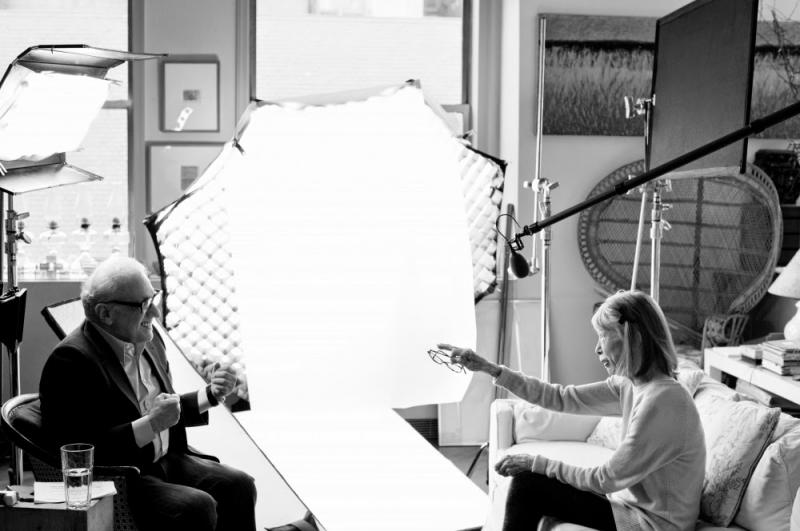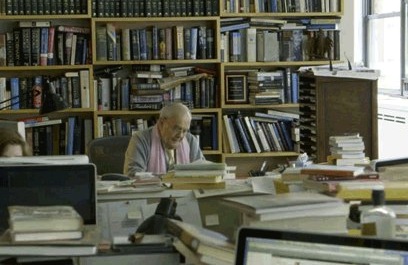Arena: The 50 Year Argument, BBC Four | reviews, news & interviews
Arena: The 50 Year Argument, BBC Four
Arena: The 50 Year Argument, BBC Four
A warmly engaging film about the 'New York Review of Books' might have been more than a birthday love-in

Well, I’ll be damned if subscriptions don’t shoot up this summer. This lovingly made paean to the New York Review of Books, directed by Martin Scorsese and his long-time documentary collaborator David Tedeschi, was better than any advert, though I’d hesitate – but only briefly – to say that it was one long advert.
One’s attention was drawn early on to that famous masthead: the word “Books”, it was pointed out, is smaller than the rest of the title, and not just as a design feature. The NYRB isn’t just a magazine that reviews books but is “more of a movement”, at least according to one high-profile contributor. Another added that it fights injustice “not just in a very local way, but globally”. I don’t want to pooh-pooh any of this, not completely, since there’s power in words – an accumulative, indirect, slow-burning, sometimes misfiring kind of power, but power nonetheless – and the power the NYRB was given to promote was not in any robust editorial line that sets it out as a campaigning publication (which would surely make it a duller, more limiting read) but in its conferring of freedom.
Anecdotes were plentiful and engaging, but not especially provocative or illuminating
The NYRB makes a point of giving writers the freedom not to take an editorial line. And this is all to the good – even when contributors appear to be specifically hand-picked to cover issues of which they willingly profess themselves entirely ignorant. Indeed, the line appears to be to treat a lack of knowledge, even lack of interest, as an A* qualification. Hence the English historian’s amusement at being given a book on homosexuality in the Middle Ages, and also the suggestion given to Joan Didion that she cover some “domestic politics”, which she confesses always bores her (as we see, one of the issues she elected to write about was the “Central Park jogger rape” of 1989, producing an incisive exploration of white fear in the face of a perceived black threat after five young black defendants were accused, and eventually convicted – wrongly, as it turned out years later – of the rape of a white woman).
 The film suggested that editor Robert Silvers (pictured right) seemed to have some special magic insight into what might make his contributors tick even if the writers don’t know themselves. I’ll allow that that was one of the film’s convincing lines. But the filmmakers also went somewhat against the editor’s own maxim that journalists should "examine below the surface of commonly accepted and often official statements”. And Scorsese and Tedeschi never ventured off-message. There were no writers from near-namesake rival The New York Times Book Review, though here the older publication received quite a few take-downs. A piece about the insipid condition of book criticism in Harper’s by Elizabeth Hardwick, in which the NYT had been attacked had, after all, been the inspiration for the founding of the magazine in 1963. That and the fortuitous newspaper strike that opened a gap that the NYRB opportunistically filled.
The film suggested that editor Robert Silvers (pictured right) seemed to have some special magic insight into what might make his contributors tick even if the writers don’t know themselves. I’ll allow that that was one of the film’s convincing lines. But the filmmakers also went somewhat against the editor’s own maxim that journalists should "examine below the surface of commonly accepted and often official statements”. And Scorsese and Tedeschi never ventured off-message. There were no writers from near-namesake rival The New York Times Book Review, though here the older publication received quite a few take-downs. A piece about the insipid condition of book criticism in Harper’s by Elizabeth Hardwick, in which the NYT had been attacked had, after all, been the inspiration for the founding of the magazine in 1963. That and the fortuitous newspaper strike that opened a gap that the NYRB opportunistically filled.
The film was primarily a hymn to Silvers, one of its founding editors, who’s still editing the magazine from his floor-to-ceiling book-lined office, aged 84. As one would expect of a Scorsese doc, The 50 Year Argument was full of fabulous archive footage, beautifully edited, as well as quotes and readings from NYRB articles to drive points home with forceful eloquence. And it offered a parade of talking heads, from Didion (pictured above with Scorsese) to Colm Tóibín. Anecdotes were plentiful and engaging, but not especially provocative or illuminating. This was a happy birthday love-in.
Having recently seen Scorsese’s brilliant Bob Dylan documentary No Direction Home, I was expecting something special here too. But that had the music – the music and the choice archive footage and the narrative frame to pin it all from. And presumably Scorsese hadn’t made No Direction Home at Dylan’s request – Silvers and NYRB publisher Rea S. Hederman had approached Scorsese to make the film covering its half-century anniversary year. Still, it had some music – not folk, or apostatic electric guitar, but jazz, the quintessential smooth soundtrack of the New York intellectual (Tom Wolfe had, after all, called the magazine "the chief theoretical organ of Radical Chic"). It was an obvious choice about a film which was extremely watchable but whose subject appeared, well, just that little too at ease with itself.
MORE MARTIN SCORSESE ON THEARTSDESK
 Taxi Driver (1976). Talking to me? Scorsese's classic starring Robert De Niro (pictured) is restored and re-released on its 35th anniversary
Taxi Driver (1976). Talking to me? Scorsese's classic starring Robert De Niro (pictured) is restored and re-released on its 35th anniversary
Shutter Island (2010). Not a blinder: Leonardo DiCaprio in Martin Scorsese's feverish paranoid thriller
Hugo (2011). Scorsese does a Spielberg in sumptuous look at the origins of cinema
George Harrison - Living in the Material World (2011). Martin Scorsese's epic documentary of the Quiet One
The Wolf of Wall Street (2014). Con brio: Scorsese and DiCaprio tell of the rise and fall of a broker
Vinyl (2016). Scorsese and Jagger's series is prone to warping, skipping and scratches
Silence (2016). Scorsese's latest is a mammoth, more ponderous than profound
rating
Explore topics
Share this article
The future of Arts Journalism
You can stop theartsdesk.com closing!
We urgently need financing to survive. Our fundraising drive has thus far raised £49,000 but we need to reach £100,000 or we will be forced to close. Please contribute here: https://gofund.me/c3f6033d
And if you can forward this information to anyone who might assist, we’d be grateful.

Subscribe to theartsdesk.com
Thank you for continuing to read our work on theartsdesk.com. For unlimited access to every article in its entirety, including our archive of more than 15,000 pieces, we're asking for £5 per month or £40 per year. We feel it's a very good deal, and hope you do too.
To take a subscription now simply click here.
And if you're looking for that extra gift for a friend or family member, why not treat them to a theartsdesk.com gift subscription?
more TV
 Coldwater, ITV1 review - horror and black comedy in the Highlands
Superb cast lights up David Ireland's cunning thriller
Coldwater, ITV1 review - horror and black comedy in the Highlands
Superb cast lights up David Ireland's cunning thriller
 Blu-ray: The Sweeney - Series One
Influential and entertaining 1970s police drama, handsomely restored
Blu-ray: The Sweeney - Series One
Influential and entertaining 1970s police drama, handsomely restored
 I Fought the Law, ITVX review - how an 800-year-old law was challenged and changed
Sheridan Smith's raw performance dominates ITV's new docudrama about injustice
I Fought the Law, ITVX review - how an 800-year-old law was challenged and changed
Sheridan Smith's raw performance dominates ITV's new docudrama about injustice
 The Paper, Sky Max review - a spinoff of the US Office worth waiting 20 years for
Perfectly judged recycling of the original's key elements, with a star turn at its heart
The Paper, Sky Max review - a spinoff of the US Office worth waiting 20 years for
Perfectly judged recycling of the original's key elements, with a star turn at its heart
 The Guest, BBC One review - be careful what you wish for
A terrific Eve Myles stars in addictive Welsh mystery
The Guest, BBC One review - be careful what you wish for
A terrific Eve Myles stars in addictive Welsh mystery
 theartsdesk Q&A: Suranne Jones on 'Hostage', power pants and politics
The star and producer talks about taking on the role of Prime Minister, wearing high heels and living in the public eye
theartsdesk Q&A: Suranne Jones on 'Hostage', power pants and politics
The star and producer talks about taking on the role of Prime Minister, wearing high heels and living in the public eye
 King & Conqueror, BBC One review - not many kicks in 1066
Turgid medieval drama leaves viewers in the dark
King & Conqueror, BBC One review - not many kicks in 1066
Turgid medieval drama leaves viewers in the dark
 Hostage, Netflix review - entente not-too-cordiale
Suranne Jones and Julie Delpy cross swords in confused political drama
Hostage, Netflix review - entente not-too-cordiale
Suranne Jones and Julie Delpy cross swords in confused political drama
 In Flight, Channel 4 review - drugs, thugs and Bulgarian gangsters
Katherine Kelly's flight attendant is battling a sea of troubles
In Flight, Channel 4 review - drugs, thugs and Bulgarian gangsters
Katherine Kelly's flight attendant is battling a sea of troubles
 Alien: Earth, Disney+ review - was this interstellar journey really necessary?
Noah Hawley's lavish sci-fi series brings Ridley Scott's monster back home
Alien: Earth, Disney+ review - was this interstellar journey really necessary?
Noah Hawley's lavish sci-fi series brings Ridley Scott's monster back home
 The Count of Monte Cristo, U&Drama review - silly telly for the silly season
Umpteenth incarnation of the Alexandre Dumas novel is no better than it should be
The Count of Monte Cristo, U&Drama review - silly telly for the silly season
Umpteenth incarnation of the Alexandre Dumas novel is no better than it should be
 The Narrow Road to the Deep North, BBC One review - love, death and hell on the Burma railway
Richard Flanagan's prize-winning novel becomes a gruelling TV series
The Narrow Road to the Deep North, BBC One review - love, death and hell on the Burma railway
Richard Flanagan's prize-winning novel becomes a gruelling TV series

Add comment